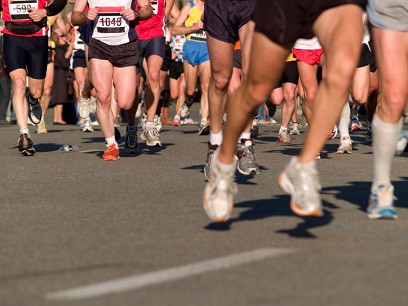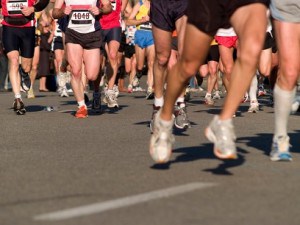A marathon is an incredible experience that people train for months to prepare for. After 6 months of work, the day is finally here and you are reaching the finish line.
Once you make it across, and I’m sure you will, you’ll have a whole new challenge on your hands. Recovering after the race is done can be one of the hardest parts of training and is certainly something that deserves a long look. Knowing what you are in for in terms of recovery is vital and you should already have a plan of attack before you run.
If you wait until you are already sore and lying on the couch, it will be too late to help much of the problem. Luckily, I’ll help you learn the kinds of damage that will happen and how to make the most of it.
The Damage
–Cold
After running a marathon, there is a very good chance that you might come down with a cold, or worse. Studies have found that this kind of extensive exercise can cause a large drop in immune system function that leads to an incredible ability to contract viruses.
For many people, a lowered immune system is also the root cause of over training. At any point, whether it is before a marathon or after, you should make sure to rest if you are sick.
–Sore
Muscle soreness is the most common problem among runners. That is especially true after running a marathon. Your entire body might feel sore and ache from head to toe. If you prepared properly, this shouldn’t be too large of a problem, but it can vary from person to person. It is also very common when someone trains in conditions that don’t accurately represent the actual route.
–Depression
Believe it or not, depression can sometimes happen after a marathon. The root cause varies, but many people experience it. Choline, a neurotransmitter, is depleted during races like this, which might explain it. For days, or even weeks, after the marathon you might feel depressed, but you’ll return to normal.
–Blisters
Blisters will probably cover your feet and cause you a lot of pain, but they normally don’t pose a large threat to your health. Ideally, your feet should be used to the shoes that you are wearing and shouldn’t have too bad of a problem in this area.
–Stress Fractures
Stress fractures come from bones becoming increasingly tired and fracture due to repeated actions. These will cause pain and slowly progress as you walk or run further. Most commonly, you’ll notice swelling on the top of your foot as a sure indicator of a stress fracture caused by the marathon.
Recovering
Recovering from these injuries is as much a part of post marathon routine as preventing them. Keep these kinds of topics in mind:
–Rehydrate
As soon as you finish the race you should make sure that you are hydrated properly. Even if you steadily took in small amounts of water throughout the race, there is a good chance that you are dehydrated to some extent.
Now that you are standing still, take the time to drink plenty of water and electrolytes. You might think you’re fine, but once the endorphins begin to die down, you might be in trouble if you didn’t stay on top of hydration. This is a more common problem than many people assume, but it is absolutely vital to recovering after a marathon.
–Load Up On Carbohydrates
Bananas, bread, pasta, fruit in general. Get some carbohydrates in you! Energy gels work great immediately following a race, too. Pumping your muscles full of carbohydrates will make up for any deficit that you were running at. You want to have plenty of fuel to run off of and repair muscles with in the hours and days following the marathon.
–Stretch
Before you do anything else after that, you should be stretching extensively. You’ll be sore, most likely, whether you stretch or not, but this can help you avoid more serious injuries. A round of all of your typical stretches will help out greatly and will at least allow you to make it out of bed.
–Treat The Blisters and Injuries
Ice water soaks can be one of the best ways to handle blisters. Should they break open, your goal should be to prevent an infection whenever possible. Soaking them for 20 minutes in a solution of water and iodine can do a lot for them. Don’t even think about popping blisters on purpose, though!
For other injuries, like muscle soreness or stress fractures, it can be a complicated problem. Muscle soreness can be handled by a professional if you would like to get a massage, but you can easily massage a lot of the trouble out. For more serious problems like stress fractures, you’ll have no choice but to seek professional help.
–Your Immune System Is In Trouble
In order to fully recover, you’ll have to get your immune system back to normal. You already know that running a marathon will severely damage your immune system function, but how can you get it back to normal?
Rest and proper nutrition are the best way to give your body the boost that it needs. For the first three days after the marathon, as much rest as you can possibly have is incredibly important. That immune system suppression can take up to two weeks to subside, so keep an eye on your health during that time.
The Final Word
Overall, the most important thing that you can do is rest and pay attention to your body. Without proper attention, you’ll easily return to your normal routine too early and injure yourself even worth.
Your diet should be as nutrient dense as possible, your blisters should be 100% gone, and you shouldn’t experience any muscle soreness at any part of your day. It can be mentally taxing, since you are ready to prepare for the next one, but a serious injury now will cause long term damage to your running career.
This article was written for RunnersGoal.com by James S., a guest author.


